
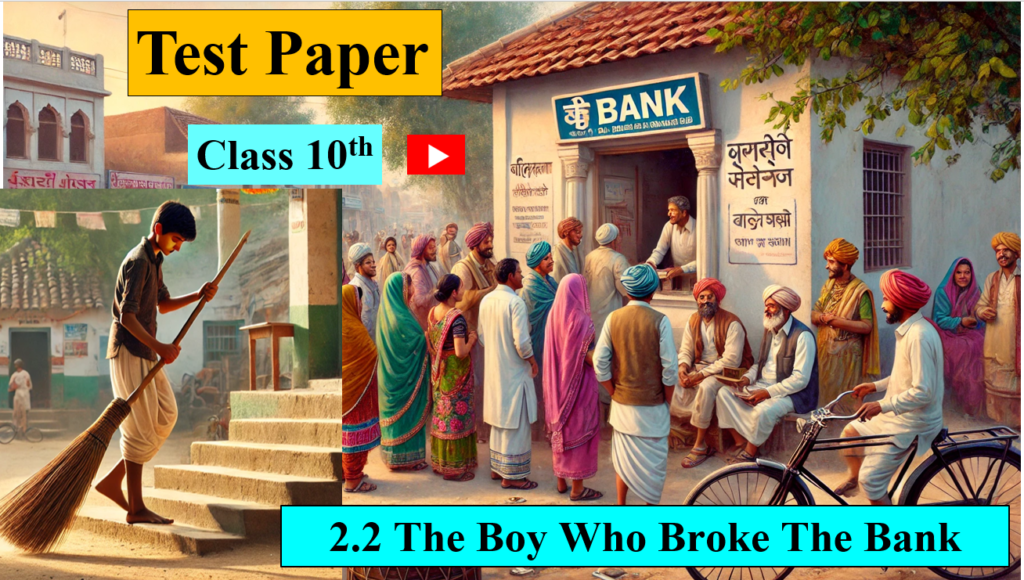
Test Paper on 2.2 The Boy Who Broke The Bank
————————————————————————–
Q1) Read the following passages and complete the given activities:
A1. Who said to whom?
(1) “Don’t raise such a dust!”
(2) “Well, tell him to come and see me tomorrow.”
Ans:
(1) Sitaram said to Nathu.
(2) Mrs. Srivastava said to Sitaram.
|
Nathu grumbled to himself as he swept the steps of the Pipalnagar Bank, owned by Seth Govind Ram. He used the small broom hurriedly and carelessly, and the dust, after rising in a cloud above his head settled down again on the steps. As Nathu was banging his pan against a dustbin, Sitaram, the washerman’s son, passed by. Sitaram was on his delivery round. He had a bundle of freshly pressed clothes balanced on his head. ‘Don’t raise such dust!’ he called out to Nathu. ‘Are you annoyed because they are still refusing to pay you an extra two rupees a month?’ ‘I don’t wish to talk about it,’ complained the sweeper-boy. ‘I haven’t even received my regular pay. And this is the twentieth of the month. Who would think a bank would hold up a poor man’s salary? As soon as I get my money, I’m off! Not another week I work in this place.’ And Nathu banged the pan against the dustbin several times, just to emphasize his point and giving himself confidence. ‘Well, I wish you luck,’ said Sitaram. ‘I’ll keep a lookout for any jobs that might suit you.’ And he plodded barefoot along the road, the big bundle of clothes hiding most of his head and shoulders. At the fourth home he visited, Sitaram heard the lady of the house mention that she was in need of a sweeper. Tying his bundle together, he said; ‘I know of a sweeper boy who’s looking for work. He can start from next month. He’s with the bank just now but they aren’t giving him his pay, and he wants to leave.’ ‘Is that so?’ said Mrs. Srivastava. ‘Well, tell him to come and see me tomorrow.’ And Sitaram, glad that he had been of service to both a customer and his friend, hoisted his bag on his shoulders and went his way. |
A2. Complete the reasons:
(1) Nathu was annoyed because ………..
(2) Nathu banged the pan against the dustbin several times because ………………
Ans:
(1) Nathu was annoyed because they were refusing to pay him an extra two rupees a month. (2) Nathu banged the pan against the dustbin several times because he wanted to draw attention to his point and giving himself confidence.
A3. Find out one word from the passage for the following explanation:
(1) showed one’s critical attitude –
(2) to draw attention to –
(3) walked heavily –
(4) raised to a higher position –
Ana:
(1) grumbled
(2) emphasize
(3) plodded
(4) hoisted
A4. Do as directed:
(1) They aren’t giving him his pay. (Add a question tag.)
(2) He’s with the bank just now but he wants to leave. (Rewrite the sentence using Though.)
Ans:
(1) They aren’t giving him his pay, are they?
(2) Though he’s with the bank just now, he wants to leave.
A5. What do you think about Nathu and his action?
Ans:
As Nathu was working as a sweeper, he should not be so arrogant. He should be considerate and understand the situation. He should work without any complaint and should not take the decision to leave the job immediately without thinking.
Q2) Read the following passages and complete the given activities:
A1. Write whether the following statements are True or False:
(1) Mrs. Srivastava had to do some shopping.
(2) A large shady tamarind tree grew at one end of the bazaar.
(3) Mrs. Bhushan was fanning herself with a small handkerchief.
(4) Mrs. Srivastava’s husband was sitting in front of Kamal Kishore’s grocery shop.
Ans:
(1) True
(2) True
(3) False
(4) False
|
Mrs. Srivastava had to do some shopping. She gave instructions to the ayah about looking after the baby, and told the cook not to be late with the midday meal. Then she set out for the Pipalnagar market place, to make her customary tour of the cloth shops. A large shady tamarind tree grew at one end of the bazaar, and it was here that Mrs. Srivastava found her friend Mrs. Bhushan sheltering from the heat. Mrs. Bhushan was fanning herself with a large handkerchief. She complained of the summer, which she affirmed, was definitely the hottest in the history of Pipalnagar. She then showed Mrs. Srivastava a sample of the cloth she was going to buy, and for five minutes they discussed its shade, texture and design. Having exhausted this topic, Mrs. Srivastava said, ‘Do you know, my dear, that Seth Govind Ram’s bank can’t even pay its employees? Only this morning I heard a complaint from their sweeper, who hasn’t received his wages for over a month!’ ‘Shocking!’ remarked Mrs. Bhushan. ‘If they can’t pay the sweeper they must be in a bad way. None of the others could be getting paid either.’ She left Mrs. Srivastava at the tamarind tree and went in search of her husband, who was sitting in front of Kamal Kishore’s photography shop, talking with the owner. |
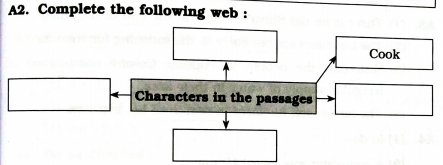
Ans:
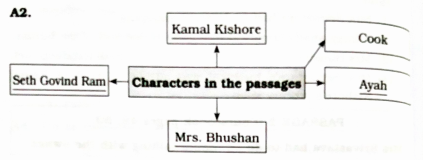
A3. Complete the following sentences by using the correct form of the phrases from the brackets:
[to complain of, at the end of, to set out for, in search of]
(1) There is an Old Shiv Temple ………….. the village.
(2) The travellers ………….. early in the morning ………….. the tour.
(3) Yesterday, the people in Popular Colony ………….. irregular supply of water in their area.
(4) The farmer left his farm ………….. his lost cow.
Ans:
(1) There is an old Shiva’s temple at the end of the village.
(2) The travellers set out early in the morning for the tour.
(3) Yesterday, the people in Popular Colony complained of irregular supply of water in their area.
(4) The farmer left his farm in search of his lost cow.
A4. Do as directed:
(1) Mrs. Srivastava had to do some shopping. (Pick out the infinitive)
(2) I heard a complaint. (Begin the sentence with ‘A complaint ……….’)
Ans:
(1) to do
(2) A complaint was heard by me.
A5. Do you like online shopping? Why?
Ans:
Yes, I like online shopping because ………
(1) it can save our money and time.
(2) we can shop at any time we want.
(3) it is easy to search for what we want.
(4) it can avoid crowds and queues.
Q3) Read the following passages and complete the given activities:
A1. Answer in one word:
(1) The place where the Seth was holidaying ………….
(2) The place where the beggar was sitting ………….
(3) The person who was cutting the hair of an elderly gentleman ………….
(4) The place where the news spread like a forest fire ………….
Ans:
(1) Kashmir
(2) pavement
(3) Deep Chand
(4) Bazaar
|
Deep Chand who was cutting the hair of an elderly gentleman, was so startled that his hand shook and he nicked his customer’s right ear. The customer yelped with pain and distress: pain, because of the cut and distress because of the awful news he had just heard. With one side of his neck still unshaven, he sped across the road to the general merchant’s store where there was a telephone. He dialled Seth Govind Ram’s number. The Seth was not at home. Where was he, then? The Seth was holidaying in Kashmir. Oh, was that so? The elderly gentleman did not believe it. He hurried back to the barber’s shop and told Deep Chand: ‘The bird has flown! Seth Govind Ram has left town. Definitely, it means a collapse.’ And then he dashed out of the shop, making a beeline for his office and chequebook. The news spread through the bazaar with the rapidity of forest fire. From the general merchant’s it travelled to the shop, circulated amongst the customers, and then spread with them in various directions, to the betel-seller, the tailor, the free vendor, the jeweller, the beggar sitting on the pavement. |
A2. Complete the web:
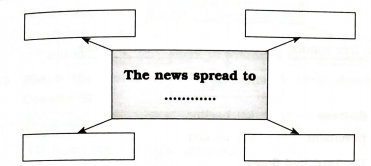
Ans:
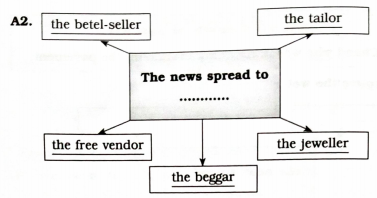
A3. Find out one word for the following from the passage:
(1) state of being upset
(2) the direct route
(3) the road for the people to walk
(4) cut slightly
Ans:
(1) distress
(2) beeline
(3) pavement
(4) nicked
A4. Do as directed:
(1) The bird has flown. (Rewrite the sentence using Past Perfect Tense.)
(2) He dialled Seth Govind Ram’s number. (Select the proper verbal question from the following.)
(a) Do he dialled Seth Govind Ram’s number?
(b) Did he dial Seth Govind Ram’s number?
(c) Was he dialled Seth Govind Ram’s number?
(d) Does he dialled Seth Govind Ram’s number?
Ans:
(1) The bird had flown.
(2) Did he dial Seth Govind Ram’s number?
A5. Do you think rumor spreads faster than fire? Support your answer in two or three lines.
Ans:
Forest fire, when it starts, is not under control and is made worse by winds that it causes. In the same way, people talk to others about the rumour without any thought or reasoning. And it goes from one person to another rapidly and spreads everywhere.
Q4) Read the following passages and complete the given activities:
A1. State whether the following statements are Rumours or Facts:
(1) The manager told the customers to go home and come back next day.
(2) Nathu was disgusted to see the broken glass and stones cluttering the steps.
(3) Seth Govind Ram was hiding in a safe deposit locker.
(4) The bank was going out of business.
Ans:
(1) Fact
(2) Fact
(3) Rumour
(4) Rumour
|
People were turned back from the counters and told to return the following day. They did not like the sound of that. And so they gathered outside, on the steps of the bank shouting ‘Give us our money or we’ll break in!’ and ‘Fetch the Seth, we know he’s hiding in a safe deposit locker!’ Mischief makers who didn’t have a paisa in the bank, joined the crowd and aggravated their mood. The manager stood at the door and tried to placate them. He declared that the bank had plenty of money but no immediate means of collecting it; he urged them to go home and come back the next day. ‘We want it now!’ chanted some of the crowd. ‘Now, now, now!’ And a brick hurtled through the air and crashed through the plate glass window of the Pipalnagar Bank. Nathu arrived next morning to sweep the steps of the bank. He saw the refuse and the broken glass and the stones cluttering the steps. Raising his hands in a gesture of horror and disgust he cried: ‘Hooligans! Sons of donkeys! As though it isn’t bad enough to be paid late, it seems my work has also to be increased!’ He smote the steps with his broom scattering the refuse. Good morning, Nathu,’ said the washerman’s boy, getting down from his bicycle. ‘Are you ready to take up a new job from the first of next month? You’ll have to I suppose, now that the bank is going out of business.’ ‘How’s that?’ said Nathu. ‘Haven’t you heard? Well you’d better wait here until half the population of Pipalnagar arrives to claim their money.’ And he waved cheerfully he did not have a bank account and sped away on his cycle. Nathu went back to sweeping the steps, muttering to himself. When he had finished his work, he sat down on the highest step, to await the arrival of the manager. He was determined to get his pay. ‘Who would have thought the bank would collapse!’ he said to himself, and looked thoughtfully into the distance. ‘I wonder how it could have happened … |
A2. Complete the following:
Reactions of the people when the bank manager told them to return on the following day.
(1) They gathered outside on the steps of the bank and ………… .
(2) Mischief makers who had not a paisa in the bank ………… .
(3) Though the manager tried to pacify them, they ………… .
(4) One of them hurled a brick through the air and ………… .
Ans:
(1) They gathered outside on the steps of the bank and started raising slogans against the bank.
(2) Mischief makers who had not a paisa in the bank also joined the crowd and annoyed them.
(3) Though the manager tried to pacify them, they became more violent.
(4) One of them hurled a brick through the air and broke the glass window of the bank and the chaos continued and on.
A3. Write one word for each of the following:
(1) a person who deliberately causes trouble to people.
(2) a person who washes clothes for other people.
(3) a person who behaves extremely noisy and violent way in public.
(4) a person who is in charge of the business of an organisation.
Ans:
(1) mischief-maker
(2) washerman
(3) hooligan
(4) manager
A4. Do as directed:
(1) He was determined to get his pay. (Change the sentence into exclamatory sentence.)
(2) Give us our money. (Change the sentence in Passive Voice.)
Ans:
(1) How determined he was to get his pay!
(2) Let our money be given to us.
A5. How are rumours spread? Are the rumours harmful? Why/Why not?
Ans:
Some rumours are harmful, and some are harmless. The rumours that are spread intentionally to harm the sentiments of people are harmful. These rumours depress, disturb, and cause harassment to people. The rumours that are spread just for fun are harmless, but they fool people.
Writing Skill
Q. 5. Develop a story with the help of the following end. Suggest a suitable title to it:
……… and thus he understood the importance of sincerity and honesty.
Ans: Honesty is the Best Policy
Aarush was ready for his Geography exam, but it got canceled because a school trustee had passed away. He was frustrated because this was his last paper and he didn’t want to study the subject again.
That evening, Aarush met his friend Manas from another school. Manas mentioned that their schools used the same exam papers. Aarush asked if he could see the papers Manas had already taken. Manas agreed and offered to show him even that day’s paper.
Aarush was excited but then learned he had to wait until Manas’ mother returned home that night. Disappointed, Aarush went home and told his mother the whole story. She asked him how much time he wasted and reminded him how he had mocked friends who cheated.
Feeling ashamed, Aarush realized his mistake. He called Manas and said he no longer wanted to see the exam paper. Aarush’s mother praised him, and he felt relieved and happy, understanding the importance of honesty and integrity.
